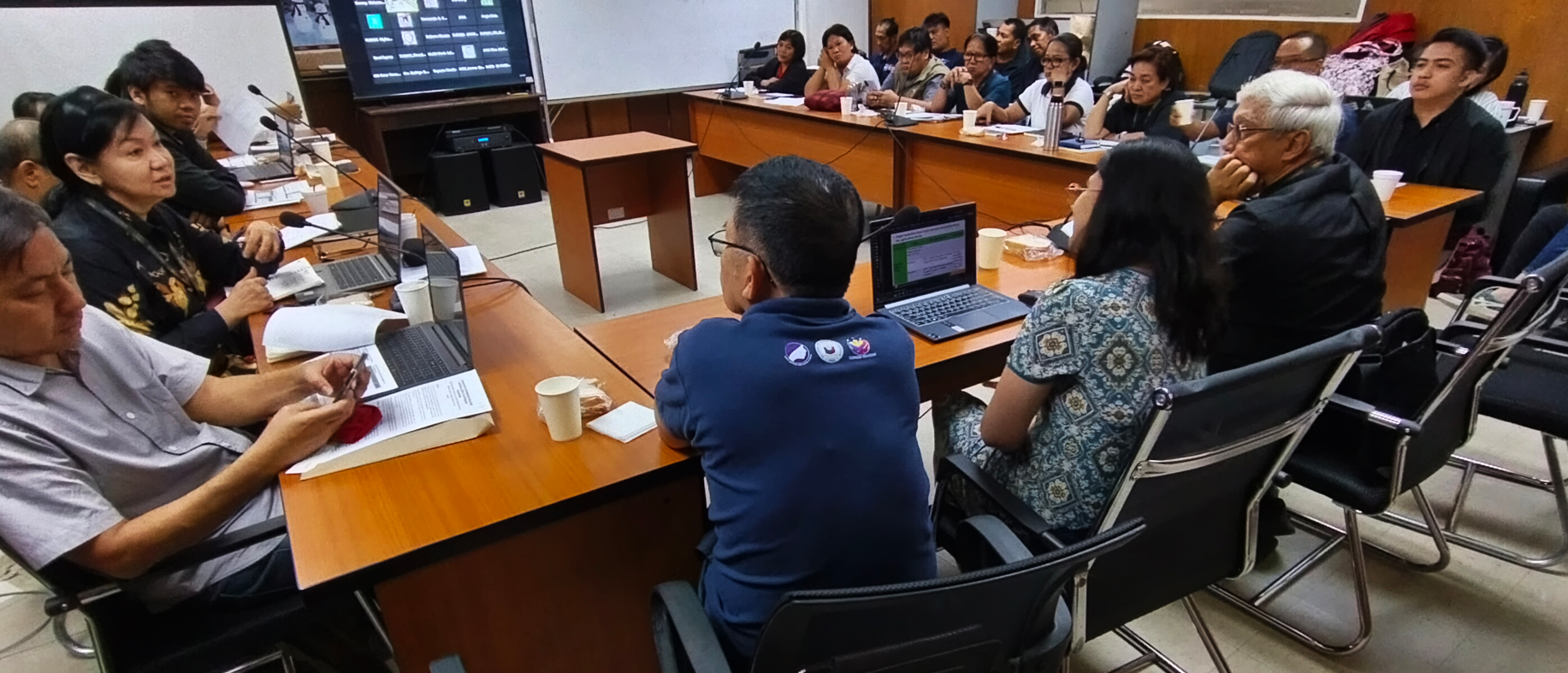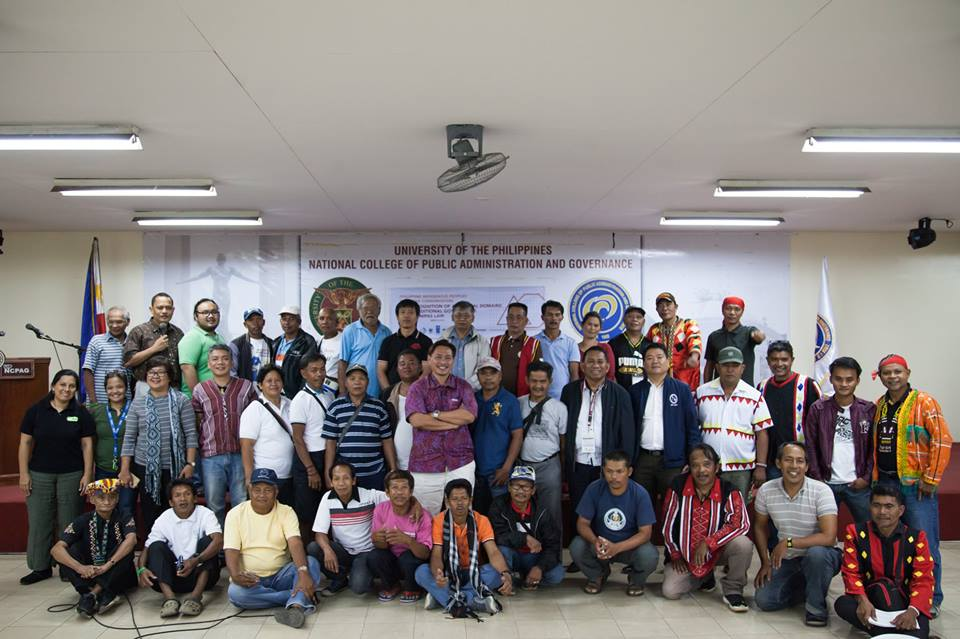


Quezon City, Philippines – On 25-26 March 2019, community Leaders from 28 Indigenous Peoples Groups in the Philippines were convened to assert their right to self-governance in the “National Indigenous Peoples’ Dialogue on the Expanded National Integrated Protected Areas System (ENIPAS)” at the Assembly Hall of the National College of Public Administration and Governance, University of the Philippines, Diliman, Quezon City. This was led by the Philippine Indigenous Peoples’ Community Conserved Territories and Areas Consortium (Philippine ICCA Consortium) or the Bukluran ng mga Katutubo para sa Pangangalaga ng Kalikasan sa Pilipinas (Bukluran), in partnership with the Asian NGO Coalition for Agrarian Reform and Rural Development (ANGOC), Philippine Association for Inter-cultural Development (PAFID), the Non-Timber Forest Products-Exchange Program (NTFP-EP), and the Project Management Unit of the Philippine ICCA project under the Biodiversity Management Bureau (DENR-BMB) with the support of Global Environment Facility (GEF) of the United Nations Development Programme (UNDP) and the Forest Foundation Philippines.
On 22 June 2018, Republic Act 11038 or the ENIPAS was signed into law containing in it affirmative policies that “ancestral and customary rights shall be accorded due recognition” within protected areas. The passage of such law is celebrated especially by indigenous communities in the Philippines as it provides concrete policy solutions amidst the many resource governance conflicts that have persisted in the management of protected areas affecting ancestral domains nationwide as with the world. This landmark legislation have drawn the attention of the international conservation community and is anticipated to provide a model for harmonious co-existence of traditional resource governance and government-led conservation.
According to the analysis of data from the DENR-BMB and the National Commission on Indigenous Peoples (NCIP) by PAFID, there are a total of 62 protected areas affecting 84 ancestral domains with a total interface area of 1,227,158.9699 hectares nationwide. Below is a breakdown of the said affected area.

Ms. Norma Molinyawe of the National Parks Division of the DENR-BMB provided a thorough discussion of the key provisions in the ENIPAS that guarantee the right of indigenous communities to self-governance within their ancestral domains as they are affected by protected areas. She expressed that the DENR is open to areas of collaboration on the governance of protected areas recognizing that indigenous communities have long been there and have been instrumental in the conservation of biodiversity in such areas.

Representative Teodoro “Teddy” Brawner Baguilat Jr. of the Lone District of Ifugao, and President of the Global ICCA Consortium shared his insights on the ENIPAS that in his participation in crafting and lobbying for the passage of such law, he emphasized that as with any legislative process, it was a political exercise. Many inputs were gathered and had to be balanced in crafting the law. As such, although the ENIPAS is not a perfect law, it was a triumph that key provisions have been included in the ENIPAS that mandates recognition and respect of indigenous peoples’ right to self-governance within protected areas.
Representative Baguilat highlighted that the objectives of the ENIPAS and that of indigenous peoples in their ICCAs are common: to protect and nurture biodiversity. The key challenge lies in implementing the law, particularly in fleshing out how the mechanisms of the government and that of indigenous peoples can be harmonized. Hence, the DENR is encouraged to pursue areas of collaboration with indigenous peoples to ensure that the law is implemented to the letter. As for indigenous peoples, they are empowered by the law to have their voices heard in the governance of protected areas.
He said that although the ENIPAS provides a framework for the collaboration of the government and indigenous peoples in the conservation of biodiversity, he pushes for the passage of the ICCA Bill into law. The ICCA Bill provides clearer guidelines on how indigenous communities shall be empowered to exercise self-governance over their sacred lands. He provided his commitment to continue his support for the passage of the ICCA Bill as the President of the Global ICCA Consortium, and shall pursue local initiatives to declare ICCAs in his province.

Executive Director Rogelio Bantayan of the NCIP emphasized that any program or project that shall be implemented in an ancestral domain, whether by government or other sectors must secure Free, Prior, and Informed Consent (FPIC) from affected indigenous communities. In securing FPIC, the NCIP must be involved as the government agency imbued with the mandate to lead the implementation of the Republic Act 8357 or the Indigenous Peoples Rights Act (IPRA). Hence, the Executive Director asserted that the implementation of the ENIPAS in ancestral domains must respect the right of indigenous peoples to self-governance, of which the FPIC is a key mechanism. In the same vein, where protected areas shall affect ancestral domains, the NCIP must play a role in the governance of such interface areas. This brought the Executive Director to point out that the NCIP must be a member of the Protected Area Management Board (PAMB) where necessary.

The indigenous community leaders provided their reflections on the inputs provided by the resource speakers and shared their stories in asserting their right to self-governance in their ancestral domains affected by Protected Areas. Datu Johnny Guina of the Portulin Talaandig Tribal Association (PTTA) shared the triumph of indigenous communities in Mount Kalatungan Range Natural Park where their harmonious relationship with the Protected Area Supervisor has ensured that the self-governance of five (5) indigenous communities present in the area are respected and upheld. To date, they have been able to earn the support of the PAMB and of other stakeholders in the implementation of their Ancestral Domain Sustainable Development and Protection Plan (ADSDPP) within the Mount Kalatungan Range Natural Park.

Former NCIP Commissioner for the Island Regions Lagtum Pasag of the Buhid tribe in Mindoro Island lamented that despite the active participation of community leaders from the Buhid and Bangon tribes in the governance of the Mount Iglit Baco National Park, the PAMB issues and enforces regulations that run contrary to their traditional governance. Mr. Yawin-ay Yayaw of the Bangon tribe said that the PAMB continues to marginalize the traditional governance of indigenous peoples and have curtailed their freedom of movement within their ancestral domains denying them access to sources of food and livelihood, despite said areas having legal recognition in their Certificate of Ancestral Domain Title (CADT). Mr. Matigon Soligam of the Buhid tribe and Vice President for Visayas and the Island Regions of the Bukluran shared that it seems that the PAMB in such area puts higher importance to the tamaraws and other endangered species in their area than the Mangyan tribes who have protected and cared for them since time immemorial.


Mr. Giovanni Reyes, President of the Bukluran presented the “Indigenous Peoples’ Declaration on the Recognition and Respect of Indigenous Governance in Ancestral Domains affected by Protected Areas,” which contains the collective position and recommendations of the indigenous peoples there represented. It asserts to wit that:
Credits to the Philippine ICCA Project of the BMB for the photos.
